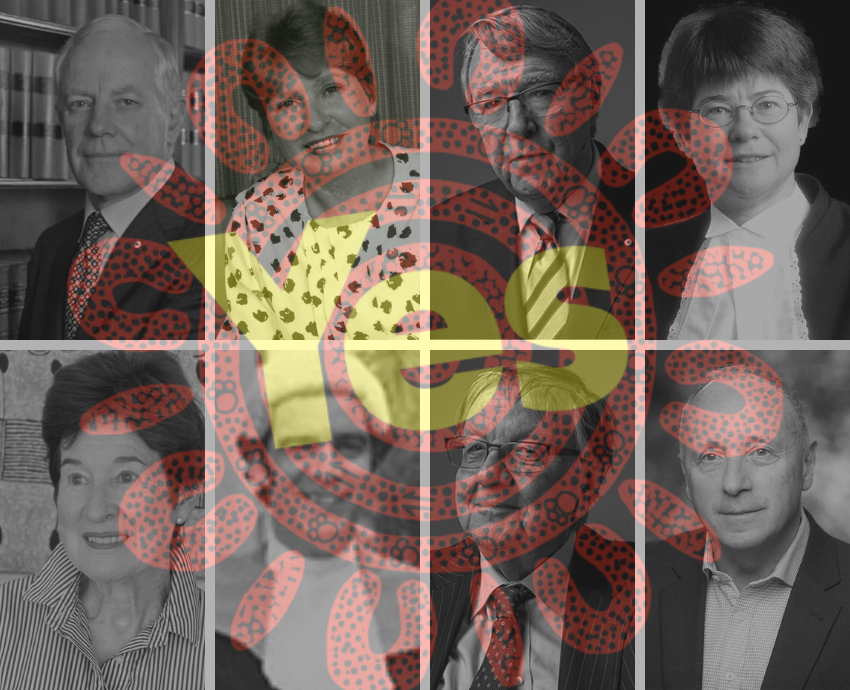
Below is an open letter to the Australian public, first published by The Australia Institute (TAI) on August 1. The group of former judges make up TAI’s National Integrity Committee which, since 2017, has been designing the principles of an effective national integrity commission.
• • •
We are individuals representing no political party or political interest. We speak, rather, as retired judges who spent our professional lives listening to, and seeking to evaluate, contending arguments.
We have since considered carefully both the case for, and the case against, the proposed Voice to Parliament.
Having done so, we confidently believe that, by raising the quality of our public debate, the proposed Voice will both enrich our democracy and increase the likelihood of governments making correct decisions about matters that affect Indigenous peoples. It will also, and very importantly, give Indigenous Australians their due recognition in our Constitution as this nation’s first peoples.
Democracies are at their best when decisions are made after informed and respectful debate to which all may contribute.
Life being what it is, the rich and the powerful have and will retain that privilege to a greater degree than most. Some, among them Australia’s First Nations peoples, have continually battled to be heard at all.
If successful, the referendum on the Voice will not diminish the influence of anyone. But it will help to correct an historic wrong. It will give recognition, and a voice, to those who for thousands of years owned and lived in balance with this land, only to have their rights to it disregarded during the centuries which have followed settlement from other lands.
No consideration was given to the deep connections with country which the original inhabitants have incorporated into their very being; and the newcomers who now occupy their land listened, if they listened at all, with none of the empathy to which everyone should be entitled.
Constitutional recognition of the Voice in a successful referendum will acknowledge these facts, and do much to rectify a long-existing injustice. It will not, in our opinion, divide our nation. On the contrary, it will heal a wound which presently divides us. Nor will it disrupt government or destabilise the presently stable and appropriate division of power between the parliament, the executive and the judiciary.
The possibility of disruption and instability is a concern which nevertheless deserves respect (although not when it descends to ridiculous fears such as that Anzac Day will be “cancelled”). It is also reasonable to have doubts about the detail of the arrangements which will follow a successful referendum. We nevertheless firmly believe that these are not reasons for voting No.
First, Australia can draw upon its wealth of common sense and its capacity for sensible compromise.
The Voice will not waste its time, energy, finances or goodwill with silly claims that have no chance of political or judicial support. And secondly, detailed arrangements must allow for a degree of flexibility which is impossible if incorporated into a less than flexible constitution.
The details are properly to be determined by the parliament of the day according to the changing circumstances of the day.
Advocates for the No case point to the proposed amendment’s inclusion of a power in the parliament to make laws with respect to the powers of the Voice. The referendum if passed does not confer powers on parliament that it does not already have to pass such laws. We believe that the likelihood of parliament acting inappropriately in this respect is small.
In our opinion it fails to justify a No vote.
Advocates for a No vote also claim that the Voice is a creature of Canberra. That is untrue. The call for the Voice was made in the Uluru Statement from the Heart, which is the product of the widest survey of the views of First Nations peoples ever undertaken and which is a deeply respectful call “from all points of the Southern Sky”.
It includes an invitation to all Australians to create a better future. We think this invitation should be accepted.
The Hon Mary Gaudron KC, Former Judge of the High Court of Australia
The Hon Carmel McLure AC KC, Former President of the Supreme Court of Western Australia Court of Appeal
The Hon Stephen Charles; AO KC, Former Judge of the Supreme Court of Victoria Court of Appeal
The Hon Paul Stein AM KC, Former Judge of the Supreme Court of NSW Court of Appeal, former President of the Anti-Discrimination Board
The Hon David Harper AM KC, Former Judge of the Supreme Court of Victoria Court of Appeal
The Hon Anthony Whealy KC, Former Judge of the Supreme Court of NSW Court of Appeal
The Hon Robert Redlich AM KC Former Commissioner of the Victorian Independent Broad-based Anti-Corruption Commission (IBAC), former Judge of the Supreme Court of Victoria Court of Appeal
The Hon Margaret White AO, Former Judge of the Supreme Court of Queensland Court of Appeal.